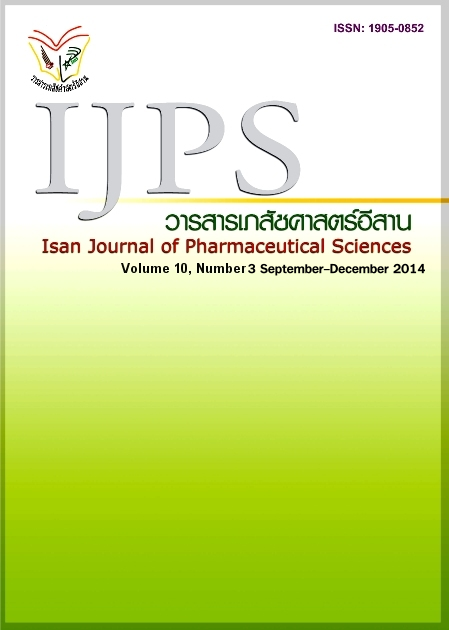Marketing Survey on Health Products from Organic Pigmented Rices
Main Article Content
Abstract
Introduction:The demand of organic rice is increasing among the heath concerned people. Butthe organic farming system and/or the value-added rice products are not enoughsupported. The objectives of this study were to survey the market demands andproduct dosage forms of health products from organic pigmented rice. Methods: A cross-sectional study wasconducted by interviewing 500 samples during January 2013 at a populardepartment store in Ubon Ratchathani Province. Descriptive statistics were usedto analyze the data. Results:The study findings demonstrated that the subjects had experience to consume theindigenous pigmented rice such as Kamyai, Red sticky, Malidang and Homnil rice.The main reason of consuming pigmented rice is the high nutritional value. Theyare mostly consumed as cooked rice and the other consumed products aregerminated rice, rice germ, rice drink and rice milk. The subjectsprefer to buy the products from fresh market, department store and OTOP shop.Most of the subjects still want to consume the products according to thenutritional values and safety of products and realized that the cost of organicrice is rather higher than the other rice. The demands of health products fromrice are in the forms of cooked rice, rice milk, rice germ, rice noodle, riceice cream, fermented rice noodle, rice bran oil, germinated rice and ricedrink. The dosage forms could be instant rice powder, tablet and capsule. Incase of cosmeceutical products from rice, they prefer to use lotion, shampoo,powder and cleansing foam with the same price as the other relative marketedproducts. The appropriate place to buy the products should be the departmentstore and the consumer emphasized on the reliability of the manufacturers orproducts. The best way to advertise products is television. Conclusion: In order to promote the consumption of organic pigmentedrice, it should place emphasis on nutritional and health issue and various health product development.
Article Details
In the case that some parts are used by others The author must Confirm that obtaining permission to use some of the original authors. And must attach evidence That the permission has been included
References
Alternative Agriculture Network– Esan. Value of indigenous pigmented rice [online]. 2011
Jul 23 [cited 2014 Mar 31]. Available from: http://aanesan.wordpress.com/
Chaimongkol T, Limnirankul, B. Approaches toward scaling up organic farming of farmers at Po Thong Charoen village, Cherng Doi sub-district, Doi Saket district, Chiang Mai province. Agricultural Sci. J. [online]. 2013 May-Aug [cited 2014Mar 31]. Available from: http://www.crdc.kmutt.ac.th/Data%202013/CRDC7/data/153-156.pdf
Green Net Cooperative. Organic rice product. [online]. 2013 [cited 2014 Mar 31]. Available from:http://www.greennet.or.th/product
Jongdee B et al. Study on the development of logistics of rice, nutraceutical and cosmeceutical products from indigenous pigmented rices obtained from organic farming. Research project report: National
Kessomboon N, Sripanidkulchai B. Situation and trend in consumption of Kaempferiaparvifl ora products. IJPS 2008; 4: 81-92.
Kullachai K, Kullachai P. Behavior, Attitude and factors infl uencing for organic vegetable eating in Bangkok Proceedings of 44th Kasetsart university annual conference: Education, social Sciences, agricultural extension and communication, humanities and home economics, 2006. Jan 30 - Feb 2; Bangkok.
Moral Rice Network. Moral Rice history. [online]. 2013 [cited 2014 Mar 31]. Available from: http://www.moralrice.net/index.php/moralrice/2013-06-29-08-25-23
Naivikul O. Rice: Sciences and technology. Kasetsart University Press, Bangkok. 2007.
Ngeoywiji S. Forms of organizational and marketing management for organic rice producers Ban Ratchareon and Ban Thonglang Ubon Ratchathani Province. Area Based Development Research Journal [online].
May-Jun [cited 2014Mar 31]. Available from: http://abcjournal.trf.or.th/index.php?option=com_attachments&task=download&id=251
Organic Agriculture Certifi cation Thailand (ACT).
Generic manual for ACT organic certifi cation [online]. 2012. [cited 2014 Mar 31]. Available from: http://www.actorganic-ert.or.th/sites/default/files/223mngeneric.pdf
Pakdeeto S, Sutamuang K. Motivation for consume organic rice on working age of consumer in Bangkok metropolitan areas. Journal of Finance Investment Marketing and Business Management. 2013; 3(1): 547-66.
Panmanee C, Kongtanajaruanun R. Willingness to pay and ability to pay for fresh organic vegetable of the consumers in Chiang Mai province. Thesis. Maiejo University. [online]. 2012 [cited 2014 Mar 31]. Available from: http://librae.mju.ac.th/goverment/20111119104834_librae/File20130410152714_24190.pdf
Puechpon D et al. Study of genetic resources of indigenous rice for expanding production in sustainable agriculture at Ban Kudhin Ban Kammad Ban Nonyang Tambon Kammad, Amphur Kudchum, Yasotorn
Province. Research project report: The Thailand Research Fund (TRF). Fiscal year 2010
Saengsri N. Factors infl uencing the consumption of organic rice in bangkok. Independent study. King Mongkut’s Institute of Technology Ladkrabang [online]. 2011 [cited 2014 Mar 31]. Available from: http://www.amc.kmitl.ac.th/research/student/Master/MBA/54/
Tanchotikan Y. Organic rice: Good rice for health and environment. Earth Net Foundation and Greenpeace South East Asia T.C.G. Printing Co.Ltd. Bangkok. 2003
Yenpiem A, Aroonsrimorakot S. Factors affecting purchasing decision for organic Jasmine rice of consumer. Proceedings of 49 th Kasetsart University Annual Conference: Humanities and social Sciences, 2011
Feb 1-4; Bangkok.


